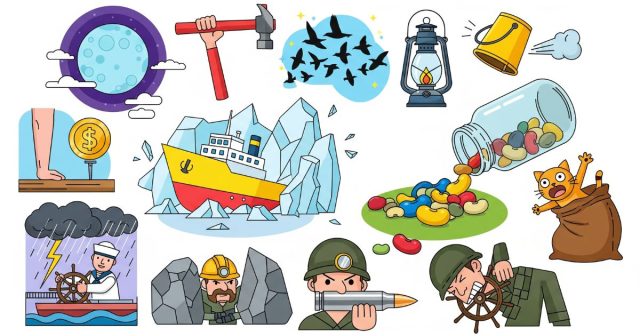Everyday idioms are the colorful threads woven into the fabric of everyday speech, giving language its vibrancy and character. Unlike literal expressions, these common phrases and figurative speech convey meanings that often surprise listeners when traced back to their origins in idioms. From nautical beginnings to literary classics, these language expressions carry stories that span centuries and cultures. Understanding everyday idioms not only deepens our appreciation for language but also helps us communicate more effectively while exploring the linguistic history behind familiar sayings.
Why Idioms Matter
Idioms do more than spice up dialogue—they reflect shared experiences and historical events that shaped our world. When we use phrases like “spill the beans” or “bite the bullet,” we tap into collective memories, connecting speakers across generations. Mastering idioms can improve reading comprehension, enhance cultural fluency, and make conversations more engaging. Whether you’re learning English as a second language or aiming to refine your native vocabulary, exploring idioms unlocks a richer understanding of how people think and interact.
12 Fascinating Everyday Idioms
1. Break the Ice

Meaning: To initiate conversation or ease tension in a social setting. Origin: This phrase dates back to the 17th century, when ships known as icebreakers would literally break through frozen waters to open new trade routes. Figuratively, the act of ‘breaking the ice’ came to describe overcoming initial awkwardness or barriers between strangers.
2. Spill the Beans
Meaning: To reveal a secret or disclose confidential information. Origin: In ancient Greece, beans were used to cast secret votes. If someone accidentally knocked over the container, the result of the vote was exposed. Thus, spilling the beans became synonymous with letting a secret slip out.
3. Bite the Bullet
Meaning: To endure a painful experience with courage and stoicism. Origin: Before anaesthesia, soldiers undergoing surgery would literally bite on a bullet to cope with pain. The phrase evolved to describe facing any difficult or unpleasant task head-on.
4. Caught Between a Rock and a Hard Place
Meaning: To be faced with two equally unpleasant options. Origin: This expression emerged in early 20th-century mining communities, where workers risked being trapped between falling rocks and unyielding mine walls. Today it depicts any tight predicament with no easy escape.
5. Under the Weather
Meaning: Feeling ill or unwell. Origin: Nautical folklore suggests that sailors experiencing seasickness were sent below deck, literally placed under the weather to recover. Over time, the phrase broadened to general illness.
6. Let the Cat Out of the Bag
Meaning: To reveal a secret unintentionally. Origin: In medieval markets, unscrupulous traders would sell piglets in sacks but sometimes substituted them with kittens. If the cat escaped the bag, the fraud was exposed, giving birth to the idiom.
7. Once in a Blue Moon
Meaning: Something that happens very rarely. Origin: A ‘blue moon’ refers to the second full moon in a calendar month—a relatively uncommon occurrence. The phrase took hold to describe infrequent events.
8. Cost an Arm and a Leg
Meaning: To be extremely expensive. Origin: While the exact source is debated, one theory links the phrase to war veterans who returned with missing limbs, sparking a metaphor for a high price paid in human terms. Regardless, it emphasizes the severity of the cost.
9. Hit the Nail on the Head
Meaning: To describe something accurately or do exactly the right thing. Origin: Dating back to carpentry, striking the nail on its head drives it in straight and true. Figuratively, it means to address an issue precisely and effectively.
10. Birds of a Feather Flock Together

Meaning: People with similar interests or characteristics tend to gravitate toward one another. Origin: Observations of bird behavior inspired this proverb, suggesting that creatures of the same kind naturally group together—a truth that applies broadly to human social habits as well.
11. Burn the Midnight Oil
Meaning: To work late into the night. Origin: Before electric lighting, scholars and writers relied on oil lamps. Those studying or writing past sunset would literally burn oil in the light, giving rise to the expression.
12. Kick the Bucket
Meaning: A euphemism for dying. Origin: One theory suggests the phrase comes from a method of animal slaughter, where a pig or calf would kick against a beam—sometimes called a bucket—during the final moments. Over time, it became a colloquialism for death.
Tips for Using Idioms
- Know your audience: Some idioms may confuse non-native speakers or cross cultural boundaries.
- Context matters: Ensure the situation matches the idiom’s tone—formal settings may require more cautious use.
- Don’t overdo it: Sprinkle idioms sparingly to maintain impact without sounding cliché.
- Learn variations: Many idioms have regional or historical twists—explore them to expand your linguistic palette.
Conclusion
Exploring idioms offers a window into culture, history, and the collective creativity of language users throughout time. Each phrase carries a story that enriches our everyday conversations and connects us to experiences far beyond our own. By understanding idiom origins and usage, you can speak more vividly and engage listeners with the hidden tales behind common expressions. Next time you ‘break the ice’ in a meeting or warn someone not to ‘spill the beans,’ you’ll appreciate the centuries of human ingenuity embedded in those few colorful words.
Read Also: Everyday Comfort Foods Uncovered: Hidden Histories and Surprising Science









